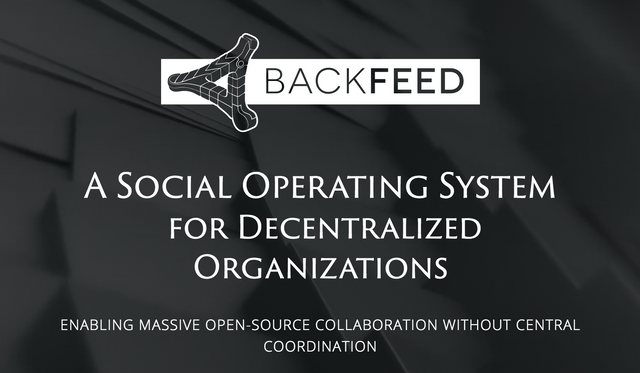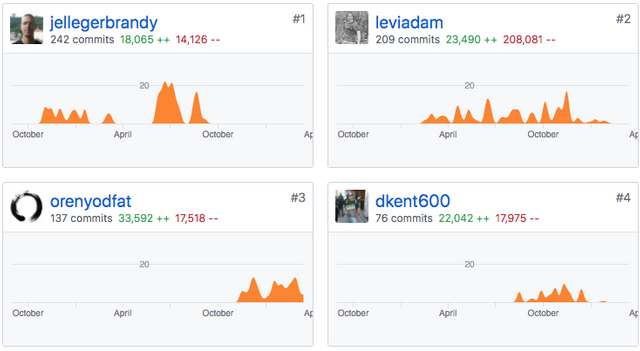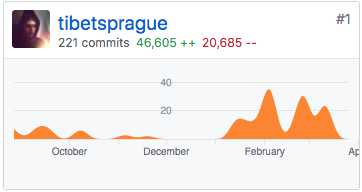ICO Review: DAOStack
DAOStack is attempting to enable effective governance in our newfound decentralized world. It will do this by offering a suite of turnkey tools for blockchain and dapps. Hence the name DAOStack: Decentralized Autonomous Organization + Stack. A very straightforward naming convention. Let's provide a definition for DAO: a DAO is an entity, group, or organization whose decisions are made programmatically.
Private Sale and Token Information
Let's get this out of the way. DAOStack is currently in private sale for their GEN token. They're currently only accepting accredited investors with minimum purchases of over $100k. Their pre-sale is set for April 10th and public sale is scheduled for April 24th. There will be a total supply of 100,000,000 tokens. A total of 40,000,000 will be sold in the ICO.
Human and Central Governance
Before talking about DAOStack I think it would be helpful to discuss governance in centralized organizations. DAOs represent an exciting area of research in computer science. Blockchains have accelerated this research but by no means has anyone found an optimal solution. It's early days so I encourage you to participate somehow, someway.
Humans have devised governance structures over our entire existence. Organizations centralize to better coordinate individuals together to reach common goals. Corporations, for example, have the goal of maximizing shareholder value. In order to achieve this, they grow in size, hiring the best talent they can find. These employees work diligently, they sharpen their skills, grow into leaders, and repeat the cycle of hiring other workers. All in the name of the shareholder. But eventually these organizations become so large that marginal gains in efficiency diminish. External competitive forces or new entrants/startups start to outmaneuver the incumbent in niche markets. We've seen countless examples of once formidable companies bite the dust. Where then did central governance help build these companies up and eventually become their undoing.
Governance in a Decentralized Network
DAOs represent a potential paradigm shift. Decentralized networks such as Bitcoin may not have company or leader to go to for decisions. How then will decisions be made to benefit all network participants? With so many new decentralized projects out there, there will certainly be as many permutations of governance as there are with real world companies. The accelerated rate of governance experimentation is certainly going to be a hot topic in crypto for years to come.
The DAO may radically reduce coordination costs. More importantly, it might solve the problem of power settling into the hands of the few. Many thought the Internet was going to be the might decentralizing force to redistribute value to the masses. It's clear the internet disseminates information worldwide (or most of the world at least), but the value and wealth of the internet has accrued to a few well run companies (aka centralized organizations).
Blockchain may accomplish what the internet failed to do: disseminate information and value to the masses.
"DAOs will radically change the way people organize, from startups to corporations, to nonprofits and even nation-states"~DAOStack whitepaper
Plug and Play
DAOStack aims to be the Wordpress for DAOs. Simply using an off-the-shelf DAO component will allow future projects to avoid reinventing the wheel. I mentioned in my post The Multi-Protocol World that future applications will simply pick and choose which baseline protocol layer to use as their "operating system". If given the opportunity to do the same with governance I think they'd seriously consider doing the same.Governance is a familiar topic where I live. I have the opportunity to vote for leaders and initiatives at the local, state, and national levels. Good governance will examine the core questions down below:
<h2 style="text-align: center;"The team The team is simply outstanding. DAOStack is Incorporated in Gibraltar but the team works remotely worldwide. Down below is a snapshot of those involved. On their website they list out a number of project members ranging from devs to legal to finance. A broad set of skills to help run the company behind the scenes. That's a lot more than many crypto projects can say.
- Eligibility. Who/what is eligible to vote? (i.e. all token holders? token holders with full nodes? token holders with lite nodes?)
- Quorum. Quorum requirements (i.e. needed % of voters required)
- Proposals. What decision types can they vote on? (i.e. hard forks, block rewards, rebranding)
- Influence. How much weight (aka influence) does each vote have? (i.e. 1 vote each, 1 vote per token, 1 vote per network weight, etc.)
- Recourse. What veto mechanisms are in place? (i.e. forced hard fork to reverse transactions)
- Scale. How does the number of participants needed to vote impact the speed at which decisions are made?
- Information. How will eligible voters attain information on initiatives. Is each voter fully qualified on such topics?
- Timing. How long will voting windows be open? Do long windows mean information parity or a greater opportunity for malicious actors to organize?
Leadership
Matan Field, CEO: Impressive background (LinkedIn). PhD in Theoretical Mathematics and Physics. He has a worthwhile TEDx Talk on YouTube.Adam Levi, CTO: Impressive background once again (LinkedIn). PhD in Theoretical Mathematics and Physics.
Yehonatan Goldman, COO: (LinkedIn) He appears to handle the business aspects of this project. He's also a wine maker. If I ever get to meet him I hope I can try some of it.
Advisor
Jeremy Epstein: co-founder of Crypto Explorers, a blockchain community based in SwitzerlandJordan Greenhall: video of Jordan chatting with DAOStack
This list is by no means comprehensive of their advisors. I am still completing my own due diligence.
Impressive integrations under way
So what is DAOStack?
DAOStack is an operating system for DAOs. DAOStack offers a suite of tools which I will dive into. They are Arc, Arc.js, ArcHive, and Alchemy. They have a very active project as seen on their GitHub repo. Bonus points.Can I also mention how refreshing it is DAOStack has opened up their code base. So many projects today are simply forking other project's code without much else innovation. Additionally, I am seeing more projects close source their code in order to maintain a "competitive advantage" when in fact the industry is so new it might help if everyone banded together and started building on each other's work. Until, at least, the technology has hardened where each project can then take off the kiddy gloves and go at it? Rant ended.
Funny, after reading their white paper they basically mention the same sentiment I just wrote above. Here it is from their white paper:
"Companies have no incentive to open-source their code, as otherwise they would assymetrically give advantage to their competitors. On the other hand, clearly, if ten competing companies produce a similar product, they could have all benefitted from co-producing the shared elements of their products rather than all independently productive them on their own"Shifting from Nash Equilibrium to a true open economyThe white paper goes over this in detail but I'll summarize it. Today's competitive economy can at times be viewed as a zero sum game. When the economic pie is not growing through technological shifts, companies fight to take share from one another. One wins. One loses. But the size of the economy is the same.
A Nash Equilibriums is one where an optimal shared outcome for everyone exists, but yet no one in the economy has an incentive to drive towards it. Rather, each individual/group is out to maximize their own advantages. The maximum for one individual may in fact reduce others in the economy.
DAOs attempts to share resources to achieve the optimal equilibrium Nash Equilibriums fail to capture. To do this, it would need to incentivize the entire network to share resources, unlike how corporate secrets and intellectual property laws accrue benefits to particular groups.
Can this really be done?
Digging into the technical components
The DAOStack is composed of separate components that work in harmony with one another. Those components are Arc, Alchemy, Arc.js, and ArcHive.Arc
Arc is an open source framework that allows developers to deploy smart contracts. Ethereum is the underlying blockchain used in DAOStack. Solidity will be the language to deploy the smart contract onto the Ethereum blockchain. Arc is intentionally modular and open source so other developers can refine Arc's offering.
DAOStack has a lot of activity in its GitHub repo. Below are the commits for Arc. The top two developers put in much of the work for this repo.
Arc.js
A jacascript library operating on the Arc Solidity framework via Web3.js. It's designed so that front end developers won't have to interact with Ethereum's blockchain or Solidity code.
Alchemy
Alchemy is the dapp that will enable individuals or companies create DAOs. It is built on a JavaScript library, Arc.js (mentioned above).
Tibetsprague contributed most of the code for Alchemy.
ArcHive
A repository of DAOs created by the community. Projects can learn from previous examples. Rather than reinventing the wheel, projects can examine the best performing DAOs and consider implementing a similar schema.
ArcHive will have three different registries: Compendium, Mosaic, and The Hive. Each registry escalates in premium features than the last with The Hive serving as the premium option. DAOStack's STACK token is the native currency used to promote DAO models and access DAO frameworks across the registries. Creators of DAOs can also receive Stack tokens for every time their DAO model is adopted. Basically it's a DAO marketplace. Over time, the best DAOs will be implemented the most and therefore collect higher revenues. Putting governance models for sale in a marketplace is DAOStack's best feature in my opinion.
I'm not an expert programmer
I do however program in Python to automate my workload. Bit there's so much I don't know. Hence why I look for others to shore up the areas I'm less familiar with. I read Andre Conje's code reviews regularly. He just published his review of DAOStack on Medium. Basically, the code is rock solid and one of the best examples of Solidity amongst any project out there. Double bonus points.
Competition
DAOStack wants to create a foundation for an anti-rival economy. But at the same time, competition is going to happen in the world we live in today. There are similar projects such as Aragon, Economic Spaces, and Colony.
Concerns
Every project should have red flags so let's get to it.
- Lead Developer Oren Sokolowsky is also the lead developer for another project currently in an ICO: Lazooz.org. I know there are plenty of people who have multiple jobs but it calls the level of focus into question. Lazooz is also a long run project which started in 2015. Here is an article on LinkedIn. It looks like Lazooz never got the ball fully rolling back in 2015 and is just now starting to do their ICO.
- Matan Field, CEO of DAOStack, also founded Lazooz. He then later founded Backfeed (backfeed.cc) in 2015, a very similar - if not the very same - project as DAOStack. Naturally, I wonder why not keep moving forward with Backfeed rather than starting DAOStack? You'll also see below if you scroll down that one of their partners is Lazooz, another company Matan founded.
- Competitor Aragon is already ahead of them in terms of product release. Their alpha was released back in January.
- Why is Lazooz (a company Matan founded) raising an ICO simultaneously? Also, why do they need to raise $30M if the project is potentially, largely, based on the work done at Backfeed? Backfeed's GitHub by the way.

My final thoughts
My post is loaded with positive statements about DAOStack. Let's be clear. This is unchartered territory we are in. Centralized organizations are everywhere today. They simply dominate as a percentage of organizations capturing value. Open source projects are commonly value providers. Rarely have they become value capturers.DAOs are a very interesting concept. In order for blockchains to avoid power consolidation, they'll need to solve DAO governance. The idea of an organization sans a CEO, a President, or a general leader would have been unimaginable for me a year ago. But that's how crazy this cryptocurrency world is. It opens up opportunities to explore how decentralized organizations can reach their goals while balancing governance participation and speed.
Matan and his team are clearly highly qualified. Their code base is clean and concise according to Andre Conje. Ultimately, I don't believe the obstacle to overcome is technological. DAOs, if successful, will be revolutionary. I raised a concern about leveraging code from his previous venture Backfeed. I'm also very concerned there appears to be multiple fundraising going on with several projects he founded. Those cannot be ignored. If you're going to invest I would drill into that further.
I think we are in early days of how a DAO should be constructed and in which situations they would be successful. The most compelling feature in the project is the ArcHive. If enough projects adopt it, it could be a valuable library for projects to leverage. But will they? Will projects willingly open up their knowledge/resources in order to charge towards a greater good, or will they maximize for their own gains. Nash Equilibrium as the status quo. In my opinion, adoption is going to be DaoStack's largest issue.
They have a vision. Check.
They have the team. Check.
They have a solid code base and testnet. Check.If they can clear their name with their intricate web of projects (Lazooz, Backfeed) I think it may be worth taking a look at. $30M also seems a bit high in my opinion.
Hopefully projects will follow suit and give DAOStack serious consideration.I struck out the previous sentence because I am editing and I wanted everyone to see I am revising my opinion as I have begun to dig further. I am officially in "wait and see" mode.Thanks for reading.
If you like my content:
Other posts:
- Please consider donating. My blog's ethereum address: 0x1ea7ab9acd4294d32bb0c790dd08a66640342680
- Follow me on Twitter (@CryptoQuantalys)
- Start a dialogue with me: [email protected]
- CanYa Coin
- Blockchain: a game of tradeoffs: a framework for understanding blockchain
- Alchemint
- Loki Network
- Qtum
- Waves
- Banyan Network (BBN)
- Why we need regulation
- Token economics
- ICO paradox




@OriginalWorks
@originalworks